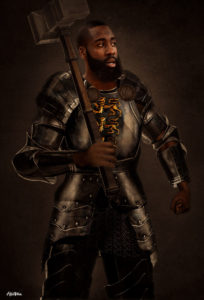 Starting in Season 7, through the penultimate episode of the entire series that aired this past Sunday, Game of Thrones has been uneven at best. Nuts and bolts logistics, previously the show’s strong suit, now wilt under the lightest scrutiny. Characters, who in earlier seasons were given ample screen time to develop and grow, now make hasty and bizarre decisions with context thrown out the window (shouts to Tommen). Fantasy elements like time travel and prophecy, once so tantalizingly crafted, have been ultimately hand-waived with, at best, cursory, one-line explanations (to wit: why does the Night King want to kill Bran???)
Starting in Season 7, through the penultimate episode of the entire series that aired this past Sunday, Game of Thrones has been uneven at best. Nuts and bolts logistics, previously the show’s strong suit, now wilt under the lightest scrutiny. Characters, who in earlier seasons were given ample screen time to develop and grow, now make hasty and bizarre decisions with context thrown out the window (shouts to Tommen). Fantasy elements like time travel and prophecy, once so tantalizingly crafted, have been ultimately hand-waived with, at best, cursory, one-line explanations (to wit: why does the Night King want to kill Bran???)
Although my polling doesn’t exactly pull from a random sample, audience opinion on these trends seems to generally fall into a few camps:
- The Fanboys: This group could give a 20 minute dissertation on the Knight of the Laughing Tree even if they’ve never read the books. They’re seriously disappointed in the show for negligently handling or completely ignoring the plot points and character beats it had so intricately started and gotten them invested in. I would put myself in this camp.
- The Passives: This group has seen every episode but can’t remember Tormund’s name and isn’t bothered by that. They recognize plot holes, but they enjoy making fun of them more than they are bothered by them; they only tuned in in the first place to see some tits and dragons, after all.
- The Perspectives: This group’s engagement with the show typically falls somewhere in between the first two groups, and possibly because of that takes a glass-half-full stance. Often not as interested in the show’s fantasy lore, they are happy that the show is returning to is machiavellian politics, and would like to point out that we should all appreciate the monoculture and the sheer achievement of spectacle. And we should cut the show some slack; its virtually impossible to satisfactorily end a hyper-analyzed show like Thrones, especially when you’re working on truncated schedule.
This disparity in satisfaction is interesting in part because it didn’t have to happen. Through Winds of Winter, the Season 6 finale which The Ringer ranked as the best episode the show had yet offered, it seemed like every audience segment was happy. Yet after that, everything seemed to change, and not just because we moved beyond George RR Martin’s proven roadmap.
Instead, the real cause of the show’s decline is the expedited timeline, the decision The Suits made to target a series wrap just 13 episodes after Cersei blew up the Sept. This choice, which I included as a justification cited in the last line of the Perspectives’ position summary, is really what it’s all about.
And this choice is exactly like when OKC traded James Harden.
Really, the two are alike in so many ways:
- Original Sin: People will always complain about individual choices (why did Jon give a cold-shoulder goodbye to Ghost?) or moves (why do you enable Westbrook to chase stats?) in the fallout of these decisions, but once that initial mistake was made there’s no going back.Some fans are able to live with the sunk cost, rationalizing that they’re making the best of their reality moving forward (e.g., we didn’t have time to make the direwolves real characters, you want to keep Westbrook happy to keep him since you can’t attract free agents). Others will never get over the fact that they should never have been in that position in the first place.
- Conflicting Interests: Despite showrunners Benioff and Weiss claiming otherwise, the choice to end Thrones after two more shortened seasons was not pure altruism; if all they cared about was making the best show possible, that decision would have been made differently. Same thing goes with the Thunder. If their only concern was winning as many games and titles as possible, The Beard doesn’t get traded. They don’t break up the young core of Harden, Durant and Westbrook that just went toe-to-toe with Lebron’s Heat in the Finals.
- External Pressures: Neither Thrones nor OKC were able to focus on those pure objectives (art, winning) because there were other influencers involved that had other motives. Successful actors and producers don’t want to commit to a single production in perpetuity. Ownership groups, particularly those in small markets, don’t want to pay the luxury tax.
- Diehards Complain, Casual Fans Love: The negative consequences rankle fanboys and League Pass Dorks way more than the casual viewer. Lots of NBA fans loved witnessing Westbrook’s triple double; basketball purists hated it.
- Hot Out the Gates: Both Thrones and OKC did everything right on their upward trajectories. They cast/drafted well, transformed their rosters into some of Hollywoods’/the league’s biggest stars, became a true blockbuster/powerhouse, and made it to the end game/the Finals with a bright future still to come. After the 2012 finals / Winds of Winter, there was no reason to expect anything but continued success.
- So Close: And yet, neither was able to seal the deal, and it was all downhill from there. After pulling off essentially perfect rebuilds/world building, both experienced a substantial fall in quality and have never been the same since.
Oh, and I can’t forget facial hair. Beards are prominently involved in both.
Anyway, thanks for reading, y’all. Fingers crossed for the Finale!
